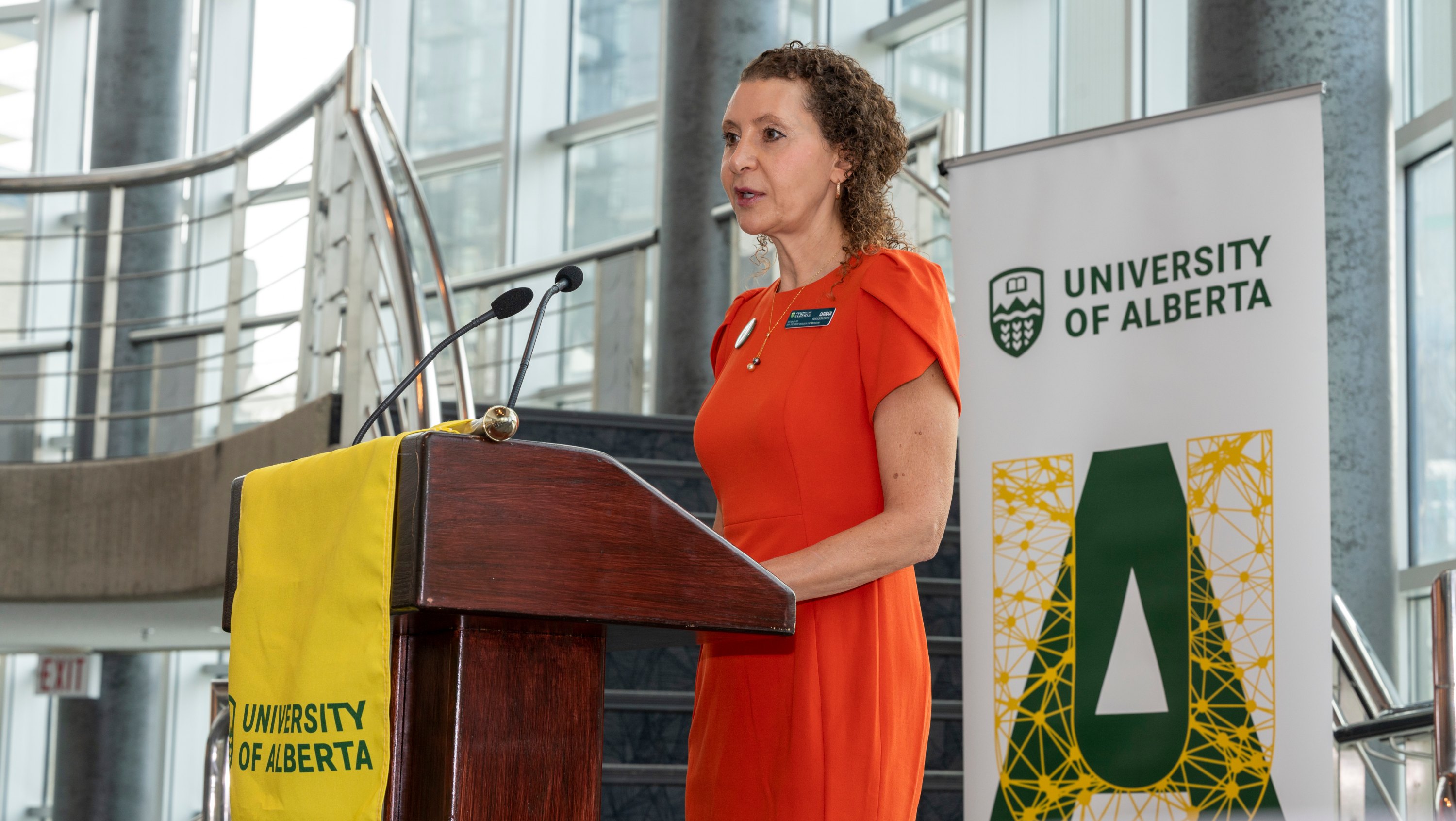The University of Alberta’s world-leading expertise on energy and environmental solutions will be in the spotlight at the United Nations Climate Change Conference (COP28) in Dubai, UAE, as leaders from around the world seek out innovative solutions to the most pressing climate-related challenges.
U of A president Bill Flanagan and Aminah Robinson Fayek, U of A vice-president of research and innovation, will headline a panel on Dec. 5 titled “Net Zero Energy Solutions: Partnerships to Get Technologies to Market.”
“Finding and implementing solutions to climate change requires collaboration and partnerships on a global scale — which is why opportunities like COP28 are vital to sustaining the world’s collective momentum toward action,” says Flanagan, who is representing the collective voices of the Worldwide Universities Network (WUN) at the conference for the second straight year.
Flanagan will highlight the U of A’s strategic partnerships with government, industry, Indigenous communities and academia, and the university’s leading research excellence in energy and the environment — with a focus on net-zero energy solutions.
These efforts align with the Government of Canada’s goals to avert the worst impacts of climate change and commitment to achieving net-zero emissions by 2050.
Other areas of expertise forged the backbone of the science used to make policy — for instance, the Alberta government’s newly minted Alberta Carbon Capture Incentive Program, which will provide project developers with a 12 per cent grant to build facilities to store carbon. This strategic measure, designed to attract billions in investment dollars into Alberta’s retooled energy sector, would not be possible without the U of A’s unparalleled work in carbon capture and storage, particularly engineering professor Rick Chalaturnyk’s decades of work in the area.
From the early days of the IEA GHG Weyburn CO2 Storage Monitoring project from 2000 to 2012, to their current research at Aquistore — the geological storage component of SaskPower’s Boundary Dam carbon capture and storage project — Chalaturnyk’s team has focused on assuring the integrity and safety of subsurface operations for a broad range of energy technologies. More recently, his work has included examining synergies between CO2 geological storage and geothermal production using a process called CO2 plume geothermal. Applying this concept to a proposed geothermal site south of Grande Prairie not only has the potential to create offsets equivalent to taking nearly 21,000 cars off the road, but could also eventually generate net-zero energy by using CO2 instead of water to pump geothermal heat up from deep below the Earth’s surface.
“No other university in Canada is at the forefront of developing energy and climate solutions in the same way as the U of A. The breadth, depth and relevance of our activity is unmatched,” says Flanagan.
In a recent example of that activity, one team has found that heating our homes by burning a blend of hydrogen and natural gas, called “hythane,” could save as much as five per cent on carbon emissions without changing existing infrastructure. The researchers note it can be transported in existing pipelines and used in appliances and heating systems with current equipment.
Another U of A team has developed better ways to convert carbon dioxide and glycerol, a leftover of biodiesel production, into value-added materials with wide-ranging uses including liquid hydrogen storage.
On the teaching front, a new course that prepares students to shape the future of sustainability by taking an in-depth look at the UN’s Sustainable Development Goals for 2030 is helping students bring critical thinking and creative problem-solving into their careers with sustainability in mind.
At COP, Robinson Fayek will moderate a panel in which leaders of energy giant Suncor and General Fusion, a company developing technology for commercial fusion energy, as well as representatives from the Government of Alberta and the Government of Canada, will also take a closer look at the partnerships needed to get innovations from WUN researchers to market.

Flanagan cites the U of A’s partnerships with six Indian Institutes of Technology and technologies like the biowaste-to-fuel technology a U of A spinoff company is producing in collaboration with Edmonton International Airport as textbook examples of leveraging mutual strengths in the fields of energy and climate research.
All of this and more contributes to the university’s progress toward the UN’s Sustainable Development Goals, a collective undertaking that has the U of A ranked seventh in the world in the 2023 Times Higher Education Impact Rankings.
“Climate change is the ultimate transdisciplinary challenge of our time. The U of A — and all post-secondary institutions — are positioned to be vital engines of the solutions we need. Let us share our knowledge and work together toward a better, more sustainable future,” says Flanagan.
Also attending COP28 will be Sherilee Harper, Canada Research Chair in Climate Change and Health, professor in the School of Public Health and vice-chair of a working group of the United Nations’ Intergovernmental Panel on Climate Change (IPCC).
Though she will be representing the IPCC at this year’s COP, she is proud the university president and vice-president will be present at COP28, noting it “sends a really strong and important message.”
“Very few university presidents will be there, and I think that shows that the University of Alberta is a climate change university,” adds Harper. “It’s something I often hear at international meetings: ‘University of Alberta does strong transdisciplinary climate change research.’”
